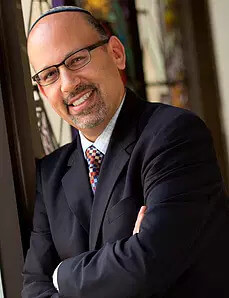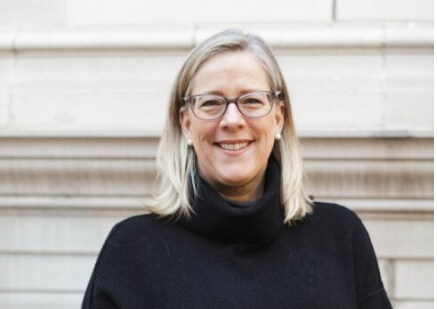‘Are you a Jew?’ To serve on a synagogue board, increasingly the answer can be ‘no’
As more non-Jews join synagogue boards, more congregations are asking whether they should be considered for other leadership roles

Non-Jews are playing increasingly significant roles in synagogue life, including as members of the board. Photo-illustration by Forward/iStock
The invitation to become a synagogue board member of Temple Beth El, a Reform congregation in suburban Detroit, took Brian Dickerson by surprise.
Granted, Dickerson was an active member of the congregation and felt certain he had something to offer in a leadership role. But, he told the board president who phoned to recruit him last spring, “I just want to make sure you know I’m not Jewish.”
She did know, and asked if that was a problem, recalled Dickerson, 66, the recently retired editorial page editor of the Detroit Free Press. Raised Catholic, he joined Beth El 15 years ago when he married a Jewish colleague. He told the board president: “It isn’t a problem for me if it isn’t a problem for you.’”

Mainstream Jewish movements don’t track the number of congregations with non-Jewish board members who, like Dickerson, have demonstrated a strong commitment to the synagogue as the spouse, partner or parents of congregants. But conversations with leaders in those movements indicate that while it’s not typical to have a non-Jew on the board, it’s no longer rare.
“It would be fair to say that we’re seeing this with greater frequency than five or 10 years ago,” said Amy Asin, vice president for congregational engagement and leadership experience at the Union for Reform Judaism, which includes 835 congregations.
Within the Conservative movement, “some of our congregations are increasingly seeking ways for partners of other faith backgrounds to participate in synagogue life, including serving on the board,” said Keren McGinity, the interfaith specialist at the United Synagogue of Conservative Judaism, which includes 550 congregations.
A recent trend or a non-issue?
Among the nearly 100 congregations in the Reconstructionist movement, “this conversation has been taking place for at least a decade,” said spokesperson Bryan Schwartzman. “Some Reconstructionist communities make all members, including non-Jews, eligible for board membership.”
The nascent trend is more apparent in the Reconstructionist and Reform synagogues, which, in general, have been quicker to absorb non-Jewish members into their congregations as intermarriage has become the norm among Jewish Americans.
More than 61% of Jews who’ve married since 2010 have non-Jewish spouses, according to a 2020 Pew Research Center report. That’s up from 9% for Jews married prior to 1965. (An exception to the trend: the Orthodox, who represent about 1 in 10 American Jews and among whom intermarriage is “almost non-existent” according to Pew.)
As the proportion of interfaith couples has grown in congregations — at Temple Beth Israel, a Reform synagogue in Pomona, California, for example, they represent well over a third of the membership — so have the visibility and contributions of non-Jews in their ranks.
They are paying membership dues, standing on the bima during their children’s b’nai mitzvahs and lending their expertise on synagogue committees, including what is usually the most powerful — the board that governs the congregation. Board members typically make a synagogue’s most important decisions, from hiring rabbis to approving budgets.

“When it comes to the leadership of our temple, I’m not alone in feeling that the right question to ask someone is: ‘are you part of the Jewish community? Are you part of a Jewish family?’” said Mark Miller, the senior rabbi at Temple Beth El. “I think those are more relevant questions than ‘are you a Jew?’”
Widening the welcome mat
Many synagogue leaders say non-Jews on the board both enriches the congregation and reflects its values.
“One of the duties of our board is to be an advocate for the congregation, and because we have non-Jews who are members, we want them to be represented,” said David Goldman, the executive director of San Francisco’s Temple Emanu-El.
Frederick Reeves, until recently the rabbi at KAM Isaiah Israel, a Reform synagogue in Chicago, put it more strongly. “When non-Jews in interfaith relationships are looking to be involved in a synagogue, they’re looking for a community that wants them to be there,” he said. “When you see people who are like you in a position of leadership, it reinforces that idea that this is a place you could be happy at and belong to.”
Pragmatic considerations also matter. Non-Jewish members often have fundraising, management and other expertise that they are happy to lend to the work of the board.
“They want only the best for our synagogue and some of them have profit-management skills and oversight skills,” said Rabbi Reeves. “You don’t need to be Jewish to understand those things.”
And often, noted Asin of the Reform movement, they bring a particular enthusiasm to the work. “Folks who are new to Judaism are often the most dedicated members of our congregations,” she said.
At your service
If synagogues have reason to recruit non-Jewish congregants, those non-Jewish congregants have reason to answer the call. Several interviewed for this story said they want to lead for the same reasons Jews want to lead — to give back to an institution that has given them much.
But they don’t want — or are not sure they want — to do this as Jews.
Conversion may be problematic because of the pain it would cause their parents, siblings or other family members, but “being active in a synagogue would be seen as okay,” said Asin. And it sends a message to their own children that they’re committed to a Jewish life and are hoping the same for the next generation.
“I wanted to get involved so my kids would feel more involved,” said Mary Ann Ressin, 63, a substitute teacher in Vienna, Virginia, who was raised Methodist but agreed to raise her own children Jewish when she married a Jewish man. The couple, who have two sons, now 19 and 24, settled on Northern Virginia Hebrew Congregation, a Reform synagogue in nearby Reston, where Ressin did a tour of duty on the board after serving on several other synagogue committees.
Welcomed and valued

Ressin first became involved in the congregation’s religious school, gaining the attention of the board, which wanted to focus more attention on the school and saw in Ressin a potential synagogue leader. “I always felt 100% welcomed and always felt that my contribution was valued,” said Ressin, so much so that one year the rabbi invited her to carry the Torah during Rosh Hashanah services.
Lainey Canevaro Weinstein, who was raised Catholic, and her Jewish husband, Kevin Weinstein, wanted their two daughters to have a religious upbringing.
“Kevin had a much larger family than mine, and they were much more engaged with their religion than my side of the family was,” said Canevaro Weinstein, 52, a Chicago-based marketing and communications consultant. Synagogue-shopping ultimately landed the family at KAM.
At one point, she headed up the religious school committee. She joined KAM’s board almost 10 years ago, and has since co-chaired a $5 million capital campaign.
“I’ve always felt integral to the work that needs to be done,” she said. Now she’s one of the board’s vice presidents.
Over the years she has considered converting. “But I don’t think I need to do it to be an active member of the congregation,” she said. “It’s not on my to-do list and I’ve never felt any pressure to do so.”
Not so fast
This is precisely the stance that puzzles and troubles Susan Leider, a conservative rabbi based in California.
“For me the question of non-Jews on synagogue boards is reflective of a bigger question about covenant and commitment,” Leider said. She’s fine with non-Jews joining synagogues and participating in synagogue life. But she draws the line at serving on the board.
“One of the things I’d ask someone is ‘why do you want to serve on the board of a Jewish congregation as you are currently not wanting to make explicit your commitment to the Jewish people by converting to Judaism,’” said Leider, herself a convert.
Even at synagogues that welcome non-Jews on to the board, there are limits on their leadership. At KAM, for example, non-Jews can serve on the board, but not as board president. And at Temple Beth Israel in Pomona, California, and Northern Virginia Hebrew Congregation, they can be neither president nor executive vice president. Other synagogues don’t allow non-Jews to head up the rituals committee.
And some congregations require prerequisites for joining the board.
Uncertain inclusivity
At KAM Isaiah Israel, “non-Jewish board members are married or in a long-term partnership with someone Jewish and are raising Jewish children,” said Rabbi Reeves.
Temple Beth El has the same requirements. “But our bylaws about board membership “never mention Jewish identity” of the prospective member, said Rabbi Miller, the synagogue’s rabbi.
Figuring out the rules that govern non-Jews on boards can be a challenge, said McGinity of the Conservative movement, which, like the Reform and Reconstructionist movements, leaves the matter up to individual congregations. Synagogues are trying to be inclusive while respecting tradition, McGinity said. “There’s uncertainty about how it will play out.”
Earlier this year, when the matter of non-Jews came to the fore at Pomona’s Beth Israel, where it had long been discussed, the synagogue’s bylaws hadn’t been revised in years, said Laura Zuckerman, the board’s immediate past president. As things stood, a candidate had to be a member of the synagogue in good standing, a congregant for at least a year — and Jewish.
In mid-April, after convening several discussion groups, Beth Israel sent out a survey to measure interest in revising the bylaws. The reaction among the 110-120 respondents was more positive than negative, said Zuckerman. “However, the folks who were not comfortable with a change felt it so deeply that we felt we had to postpone the decision.
“There is so much good will in our synagogue,” Zuckerman added, “and we don’t want this to be a polarizing issue. We’re going to keep discussing it.”
A seat at the table
When Dickerson, the non-Jewish Temple Beth El board member, married Laura Berman and adopted Berman’s then-7-year-old daughter, Lina, the couple agreed that she would become a bat mitzvah. They also decided that Dickerson, who wanted to be part of the experience, would join Beth El.
“Despite the fact that I wasn’t Jewish, the rabbis involved me as Lina’s father, and made me feel part of the occasion and part of the community,” he said.
But his relationship to the synagogue went beyond congregant and proud father.
Because he had occasionally spoken about current events at Beth El as a newspaper editor, board members seemed to see in him “some skills they wanted to exploit,” said Dickerson, who is contemplating conversion. “I don’t think there were any other journalists so there was a sense that I brought something unique to the table.”
He joined the board in 2022, eight years after his daughter’s bat mitzvah, and has relished the opportunity to contribute, he said, in expected and unexpected ways.
At one of the first board meetings he attended, there was a discussion about whether the temple was as haimish a place as everyone wanted it to be.
While the debate swirled around him, Dickerson furtively looked up the definition of haimish on his iPhone, and learned it was a Yiddish word meaning cozy and warm.
“I assured my fellow board members that yes, the temple was indeed haimish,” he recalled. “I liked the fact that people were concerned about it.”






















